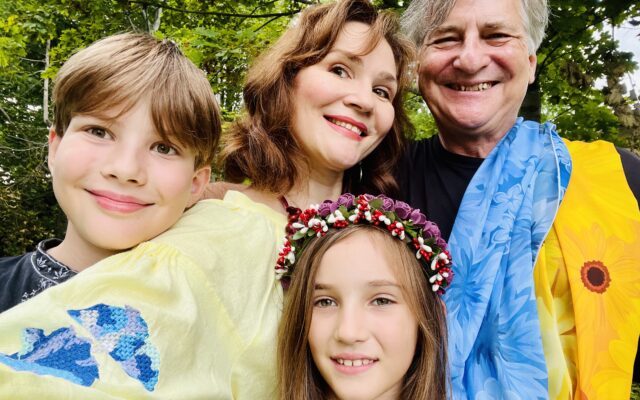
Ukrainians teach us there are many different ways to be brave
By BDN Editorial Board
Many people, us included, have used numbers to reflect on the past year that Ukrainians have experienced. The days spent under invasion, the lives lost, the refugees displaced — together these numbers help tell the awful human story of what this Russian invasion has wrought.
As powerful and distressing as these numbers are, they do not truly capture the personal anguish and strength that Ukraine and its people have experienced and exuded. It is the individual stories, from Ukrainians there and spread out across the globe, that provide the difficult but critical details of what this war is costing people.
Piscataquis Observer/Bangor Daily News reporter Valerie Royzman, who is the daughter of immigrants from Ukraine and who still has family there, has movingly provided us with some of those insights by interviewing three Ukrainian women in Maine.
“Replaying our conversations in my head, I keep returning to how the war in Ukraine is a lesson on bravery. Not bravery in the cliche sense that elicits images of heroes and men shouting as they run toward smoke and death. That will always be present during war,” Royzman wrote last week, as the world marked the one-year anniversary of Russia’s Feb. 24 invasion. “These women have revealed to me the quiet, enduring bravery of their families living under constant threat. The bravery that buoys a person’s spirit in the silent moments between explosions.”
Royzman spoke with Olga Zhuravel Maselli, an opera singer who, like her, lives in Dover-Foxcroft. After Zhuravel Maselli’s father died of a heart attack last May, she was unable to attend his funeral. She sees how the stress of this past year has impacted those close to her, from her mother’s deepening wrinkles to the way people “have told her that they feel like they’ve aged years in just 365 days,” as Royzman explained.
“They say it, and I see it,” Zhuravel Maselli said. “I see the tiredness in their eyes. And when they are laughing or something, I see they are sad.”
Kateryna Bagrii is a mother of four who works as a nurse in Ellsworth and teaches at the Beal University nursing program. She tries to keep in touch with her family in Donetsk, Ukraine, each week, where her parents, grandmother, brother and his family all live. Her mother, an obstetrician at a heavily damaged maternity hospital, has sometimes been delivering babies in homes and basements.
“I’m heartbroken, I guess,” Bagrii told Royzman, about the images from home. “I don’t know how to describe it any better. Devastated. I don’t think I have any anger toward any side. I do not accept violence from either side of the conflict. I think that all sides are doing wrong to each other.”
Masha Kotova, a senior at Colby College, was studying in London when the war began. Her parents, having initially fled with her grandmother to southwestern Ukraine, have since returned to Kyiv. Kotova has at times begged them to leave and tried to coordinate their escape when Russia first invaded.
“I have learned this year to trust my parents more with their choices and their lives,” she said.
Royzman spoke with one of the women about “syrniki,” a type of Ukrainian pancake for which there doesn’t seem to be one definitive recipe. There are, apparently, many ways to make syrniki depending on what ingredients are available. As these women continue to demonstrate, there are also many ways to be brave.
“In many ways, I could relate to their feelings, worrying about my relatives overseas. When the war first broke out, I felt like I could go an entire day holding my breath. For months, even as a journalist, I couldn’t bear to read the news coming out of Ukraine, and even asking my closest cousin for updates about her life in Kyiv began to feel hollow,” Royzman wrote. “My feelings have morphed and changed, but these women have helped me understand that there is something brave about just moving through the world some days.”
“You know Ukrainians,” Zhuravel Maselli told Royzman. “War or not war, we need to think about the future. We believe in life — that it will go on. If not for us, then for our children.”
After the past year that the Ukrainian people have been through, that perspective itself is an act of bravery.